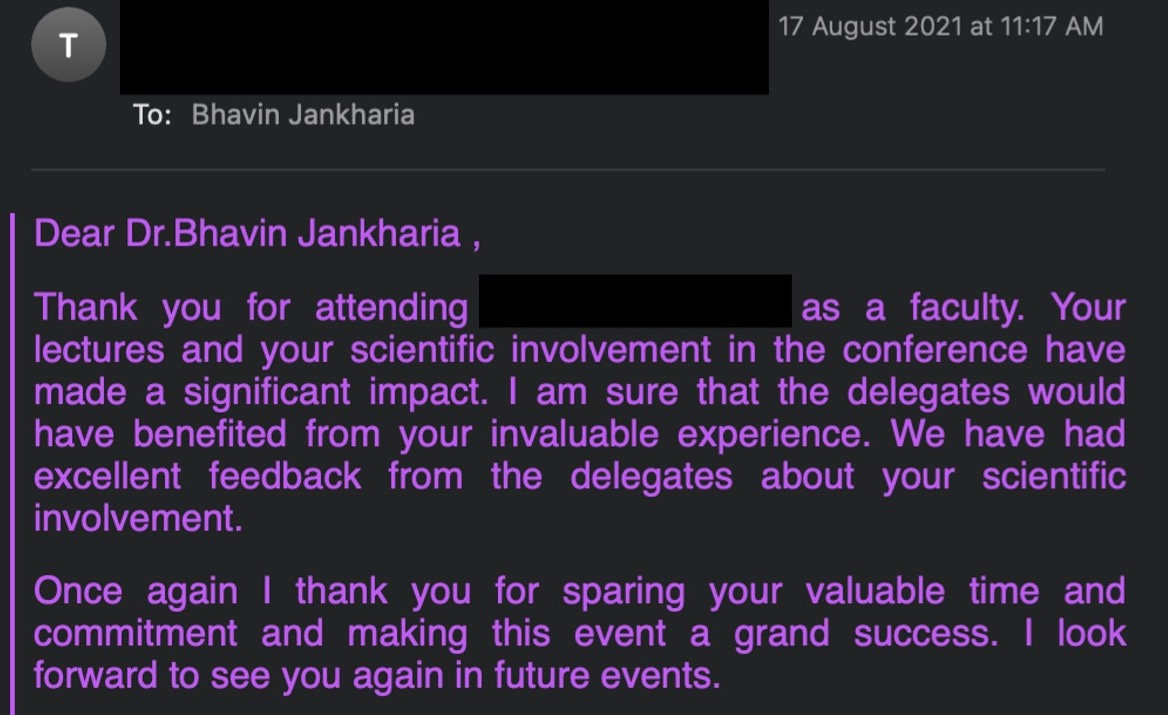Tehzeeb
A little "thank you" goes a long way
Two weeks ago, on a Saturday evening, I participated for an hour in a panel discussion on bone tumors, in one of the annual State orthopedic meetings, a mega event with multiple online halls and simultaneous lectures.
Nine days later, I got this email.
Something snapped.
I replied.
A day later, this is what I got. They had replaced the “Doctor” with my name.
I wouldn’t even have bothered, but a day later I received the email that Dr. Mark Schweitzer, the editor in chief of the Journal of Magnetic Resonance Imaging (JMRI), sends out along with the Table of Contents of the new issue. He has transformed JMRI into a model that other editors could learn something from and his interesting monthly email, which I look forward to (I re-discovered Tom Petty because of him) addresses issues beyond radiology.
His current email is addressed to the radiologists and physicists who review the articles that get published in JMRI. He apologizes for his inability this year, to personally sign the appreciation certificates that go out to them. Reviewing is basically a thankless job…a personally signed certificate saying “thank you” makes a difference. Mark points out, in contrast, the insensitive and disrespectful behavior of Donald Rumsfeld, who at some point stopped personally signing “thank you for your son’s service” letters, which are sent to the parents of young American soldiers who die in battle.
The coincidence made me think.
I don’t expect much from people and so a little actually goes a long way. Most conference organizers do send a short “thank you” message via SMS or WhatsApp or email and that’s good enough. Some take the effort to call and that’s the little “cherry on top”. And then are people who send emails like the one I have shown.
If I hadn’t received any “thank you” note, I probably wouldn’t even have remembered. But this impersonal, boiler-plate, rubbish “thank you” email got my goat. And when I mentioned this to the sender, all they did was to delete the “Doctor” and replace it with my name, with no other acknowledgement or change in the contents of the email. What the hell did this organizer think… that I wanted to print and then frame the damn email and hang it on my wall as a remembrance? Seriously…?
Tehzeeb is a lovely Urdu word that stands for a combination of grace, etiquette and courtesy. Is that too much to ask for in return for the time I have given?
What is it? Hubris? That the speakers don’t matter and the organizers are doing them a favor by inviting them to speak or participate? Callousness? Just a general lack of consideration and grace? If they cannot show courtesy to their own colleagues, how do we expect them to behave well with patients? Or is it online fatigue? Or are they just clueless? Or is it a lack of understanding of how to use electronic or social media? Or is it that there are too many speakers to thank? Even if there were 200 speakers, it wouldn’t take more than 2-3 hours to send personalized thank you notes. Is that too much time to spend over people who have given you their time that could perhaps have been spent with friends and family?
It’s not just about doctors and their time. No one likes to be taken for granted. Anyone who is invited to give their time and participate in meetings, whether online or in person, whether a banker, or a lawyer, or a teacher, or a social worker….anyone who gives us their time…needs at the least a personalized “thank you”.
It is better not to thank than to thank badly. And perhaps it is not a bad idea for conference organizers like these to attend a class on “tehzeeb”. It is never too late to learn a little grace and be a little more courteous. That’s not asking a lot, is it?




